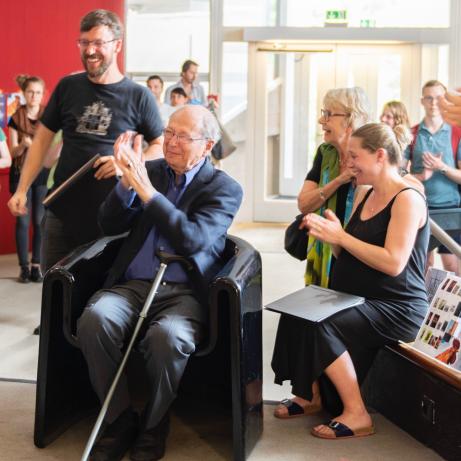In Memoriam: Wolfgang Edelstein (1929–2020)
- Mar 2, 2020
- Institute News
- Dept. Renn
The Max Planck Institute for the History of Science mourns the loss of Wolfgang Edelstein, Director emeritus of the Center of Development and Socialization at the Max Planck Institute for Human Development.
Born in Freiburg in 1929, Edelstein fled with his family from Nazi Germany to Iceland in 1938—an experience that shaped his life. After graduating from high school in Reykjavik he studied linguistics, philosophy, languages, and educational science in France and Germany. In 1962 he received his doctorate in Central Latin philology from Heidelberg University. A teacher at the Odenwald School since 1954, there he met Hellmut Becker who shared with him an interest in democratic education and learning processes. Together with Jürgen Habermas and Alexander Kluge, he wrote a memorandum that Becker used as the starting point for negotiations with the Max Planck Society on the establishment of a new institute for educational research.

© MPIB Sarah Otterstetter
In 1963, Edelstein followed Becker to Berlin. In 1973 he became a scientific member of the Max Planck Society, and ten years later director of the research area Development and Socialization. He focused his research on interculturally elucidating the interactions between social inequality and cognitive as well as socio-moral personality development from childhood to adulthood. His scientific work was recognized by an honorary doctorate in social sciences from the University of Iceland as well as by honorary professorships in educational science at the Free University of Berlin and the University of Potsdam, of which he was the founding senator.
In the years after his retirement in 1997, he was primarily involved in processes of democratic school development and projects related to democracy, including as the founder and chairman of the German Society for Democracy Education. In numerous treatises he also dealt with right-wing extremism, especially with right-wing youth culture. Until the end, he actively participated in relevant events at the institute. He was awarded for his work and extraordinary commitment with the Federal Cross of Merit 1st Class, the "Hildegard Hamm Brücher Promotion Prize for Learning and Experiencing Democracy," and the Theodor Heuss Prize among others.
As well as having played a significant role in the foundation of the MPIWG, Edelstein was involved in the establishment of the MPI for the Study of Societies; the MPI for Psycholinguistics; the MPI for Research on Collective Goods; and was one of the founding senators of the Universität Potsdam. Edelstein contributed extensively to the MPIWG, being particularly involved in the department and work of Jürgen Renn. He will be sorely missed.
